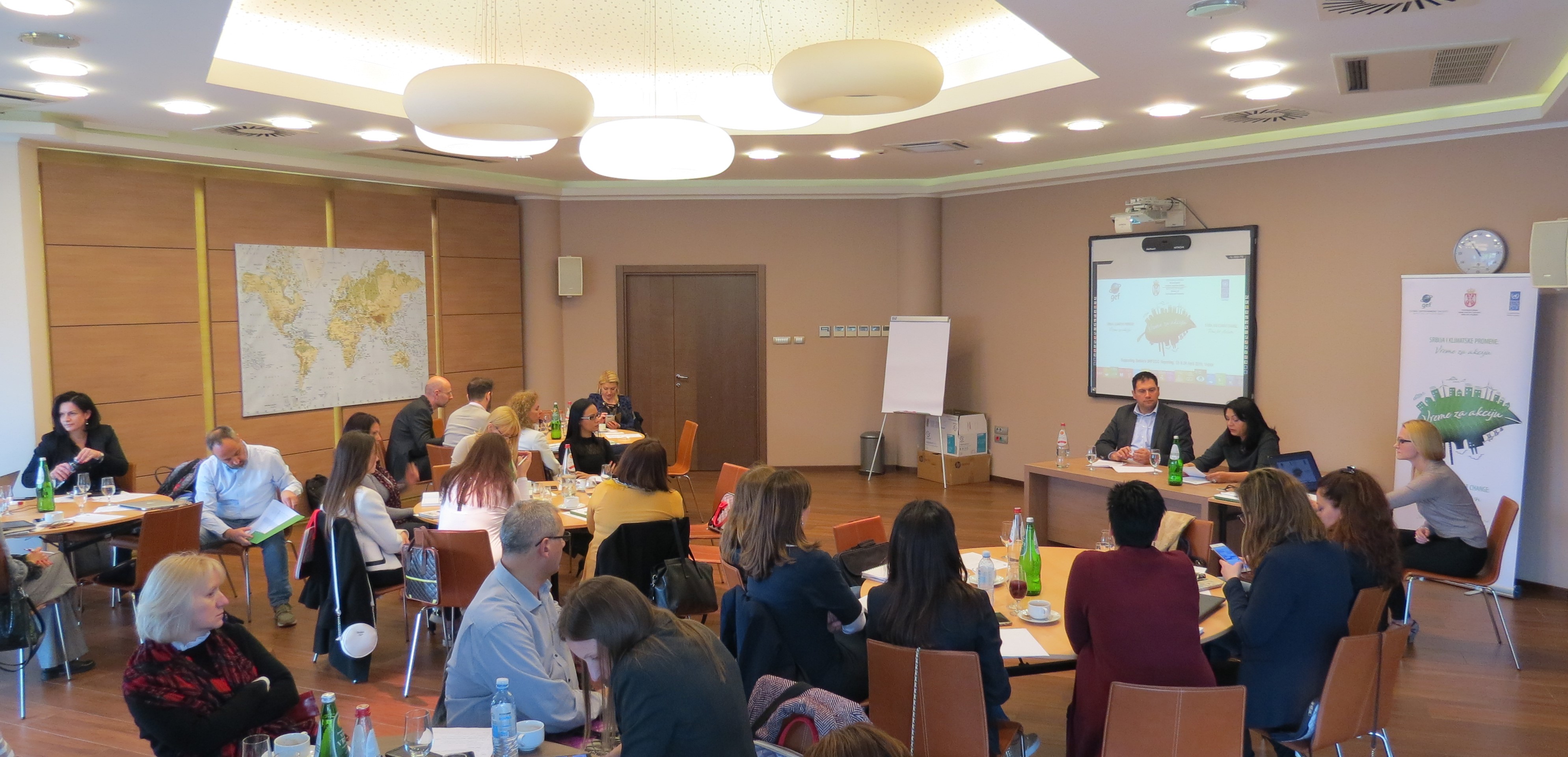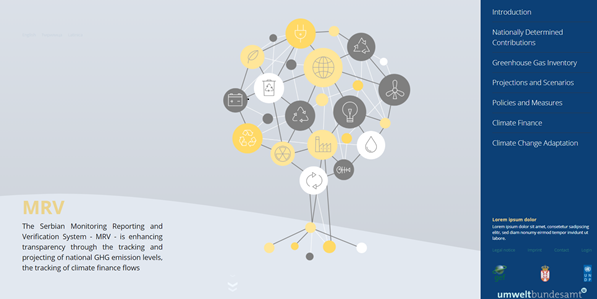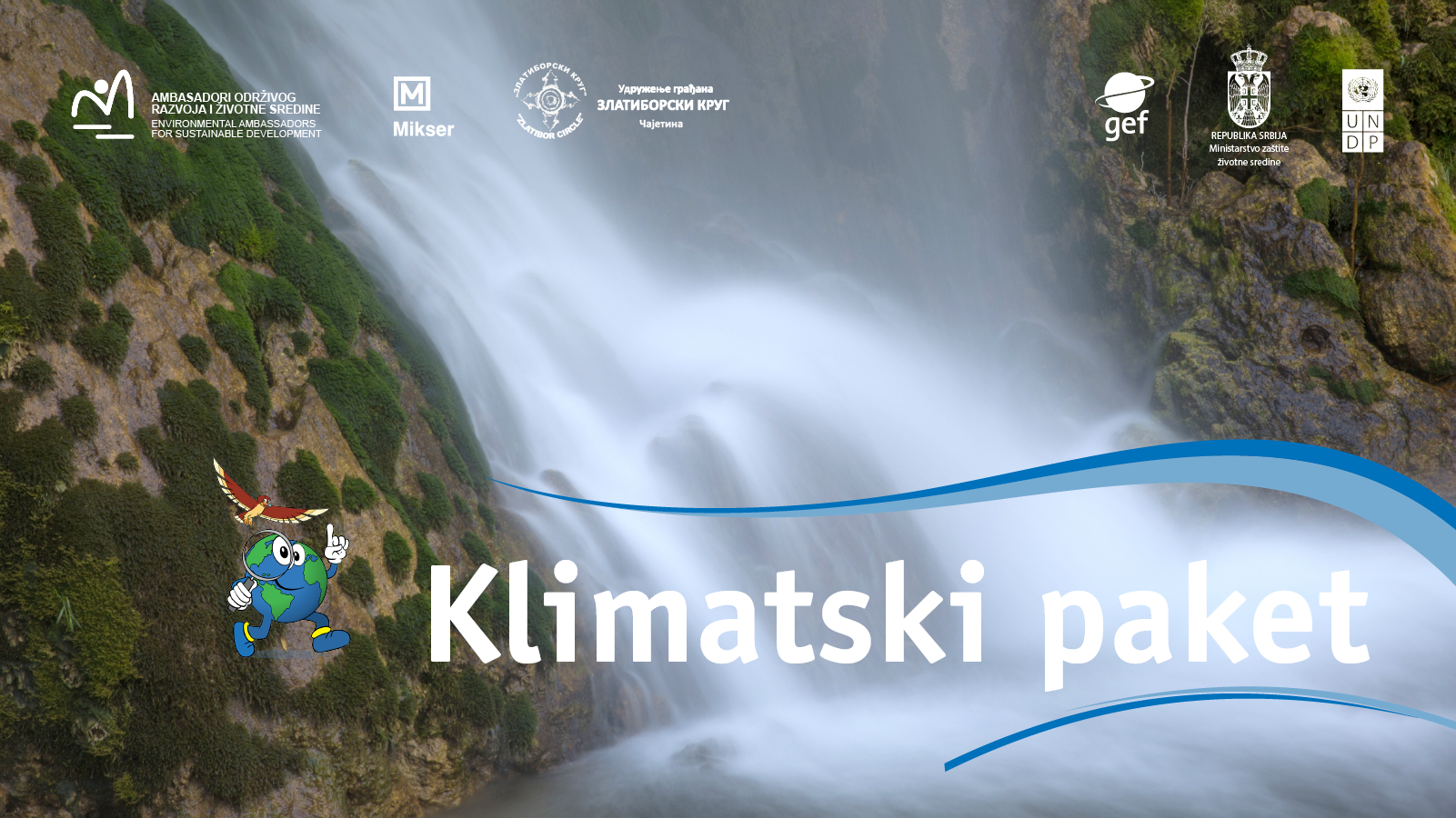Bulletin
Newsroom
- Home
- Newsroom
Keep up with opportunities
to get engaged in our work
Latest
- Pogledaj sve
- News
- Pogledaj sve
- News
All Releases
- All
- News
Project “Advancing medium and long-term adaptation planning in the Republic of Serbia” aims is to strengthen national capacities to reduce the vulnerability and risk posed by climate change through the establishment of effective cooperation and coordination of all relevant institutions, as well as to identify measures for efficient adaptation to the changed climate conditions. The focus of the project is on the sectors of agriculture, forestry, water management, energy, transport and infrastructure. It is necessary to establish a system of information flow, to import all existing data within all sectors, and to make all data transparent and accessible. The main objective of the project is to provide a sustainable climate-resilient society and economy. The project is funded by the Green Climate Fund and implemented by the United Nations Development Program in cooperation with the Ministry of Agriculture, Forestry and Water Management.
In order to allow for the comprehensive and accurate collection of data and information required for the implementation of the project, a Working Group has been established. The Working Group has a total of 23 representatives from 15 institutions. Delegated members of the Working Group are representatives of the following institutions: Ministry of Agriculture, Forestry and Water Management, Serbian Chamber of Commerce, Statistical Office od the Republic of Serbia, FAO (Food and Agriculture Organization), Ministry of Construction, Transport and Infrastructure, Ministry of Environmental Protection, Republic Hydrometeorological Institute, Public Investment Management Office, Republic Geodetic Authority, Ministry of the Interior - Emergency Sector, Provincial Secretariat for Urban Planning and Environmental Protection, Ministry of Mining and Energy, Ministry of Health, Ministry of Finance, Ministry of Education, Science and Technological Development.
The kick-off meeting of the project “Advancing medium and long-term adaptation planning in the Republic of Serbia” was held on March 11, 2020 at the Metropol Hotel.
More information available here:
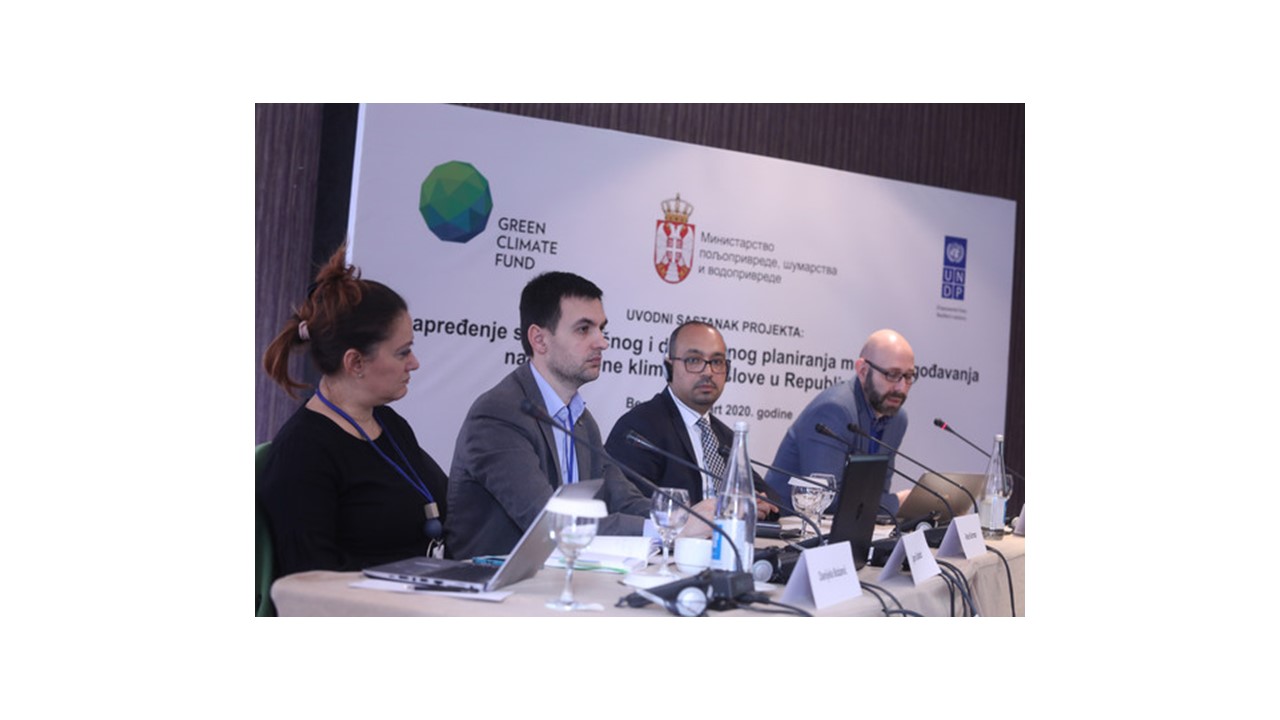
On Friday, December 27th, 2019 the UNDP in Serbia organized a meeting with representatives of the relevant national institutions which are providing their support when it comes to adaptation to changed climate conditions in Serbia through this project which will last for the next three years and will be funded by the Green Climate Fund.
The main goals of this project are to help the Government of the Republic of Serbia to:
- Develop and strengthen capacities to adapt to changed climate conditions (CCA);
- Conduct climate risk and vulnerability assessments;
- Develop effective methods, tools and informational systems for development of decisions on climate risks and sectorial adaptation measures.
The overall goal is to reduce the risk of climate change and to integrate the issues of adaptation to changed climate conditions into development planning and financing.
Beside this project inception meeting, a presentation on potential sources of financing the struggle against the climate change as well as the financing of the green projects and investments in overall was held. Discussion was focused around the existing and potential new mechanisms of financing the climate and green projects and all this in the context of accessing the global financing instruments such as the Green Climate Fund and “green credit lines” of the international finance institutions. Participants were given the opportunity to hear more about the new “Green deal” of the European Commission, a program document which puts the European development and fiscal policies in the center of the fight against the climate change, as well as about the circular economy and protection of the nature and the environment as a whole.
Professor Vladimir Djurdjevic from the Faculty of Physics of the University of Belgrade spoke about the main challenges when it comes to adaptation to climate change in Serbia with conclusion that the biggest losses will be caused by floods, droughts, high temperatures and wild fires. He said that in the period of 1890 and 1970 in overall 13 dry years were recorded while the same figure is observed for the period of 1970 to 2010, a fact which says that the number of dry years is doubled since the initiation of temperature measurements in Serbia.
Ms. Danijela Bozanic from the Climate Change Consulting presented the projected GDP losses and potential job losses in certain areas which are caused and could be affected by climate change. She spoke about the sectors in the economy that will be hit by the climate change the most. Among these are: health care, agriculture, energy sector but also the overall loss in workers productivity, availability of drinking water and crop yields. These are the factors which will have the biggest influence on the state budget, which will need to secure the adequate answers to changed climate conditions. When it comes to GDP, in case that no adaptation measures are implemented and average temperature raises to 2⁰C, the GDP could be reduced for 4.53% in the period 2020-2040 or even by 9.32% by 2100. The point was put on the overall social transformation towards the direction of climate/carbon neutrality and planning for the changed climate conditions, which means putting the focus on urgent investments in the area of preventive measures rather than on taking care of the consequences.
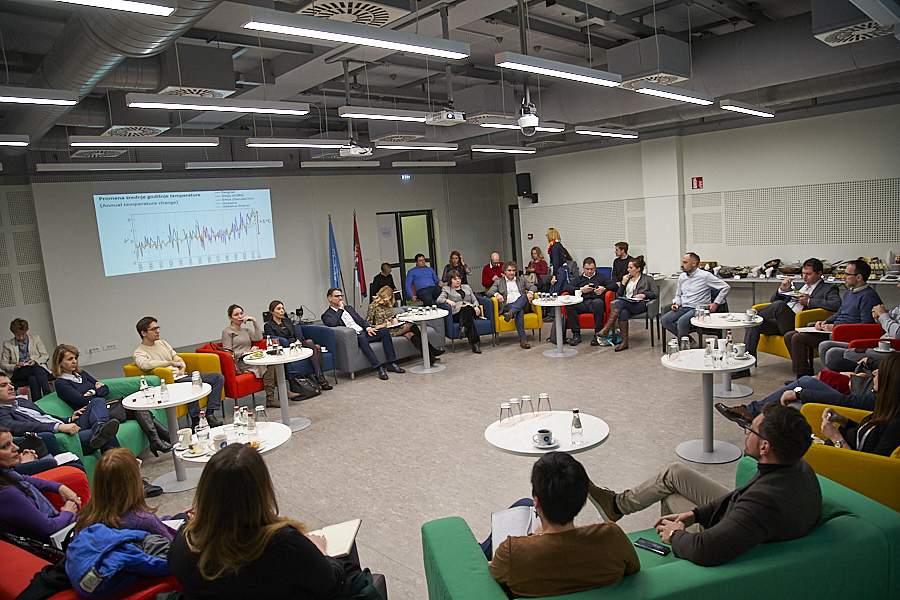
Ministry of Environmental Protection, together with UNDP, held a two-day workshop on Dialogue on climate change in Serbia. During 23 and 24 April in Vrdnik, a Working group meeting of project “Preparation of reports under United Nations Framework Convention on Climate Change” and kick off meeting of the project “Establishing transparency framework under the Paris Agreement” were held. The meeting attended 35 participants from all relevant institutions in Serbia, where a dialogue on climate change was quality and inclusive.
After the opening speeches of assistant minister of Ministry of Environmental Protection, Jasmina Jovic and programme analyst for resilient development, Zarko Petrovic, the workshop started with presenting the role and obligations of Serbia in global climate community. Having in mind that climate change already has a big impact on rising global temperatures, people, systems and living world generally, a special report of Intergovernmental Panel on Climate Change was presented, called “Global warming of 1.5оC”, in order to show what are the efforts needed for limiting global working on 1.5оC and what are benefits and differences compared to global warming of 2оC. After that, the analysis with concrete data for the Republic of Serbia on observed and future climate change was presented, prepared under the project. With detailed analysis of climate in recent years, it is observed that the five warmest years were after 2013, where 2018, according to data of Republic Hydrometeorological Service was the warmest year so far.
Following the presented climate analyses, vulnerability in the relevant sectors and possible adaptation measures were presented. Firstly, climate change will affect the sectors of agriculture, water management, forestry and the health sector. Three key issues are raised: implementation of proposed adaptation measures, sectoral synergies and priority setting. It was pointed out that it is very important to include future climate change in the planning of strategies, programs and plans so that the planning of measures should be planned from the point of view of extreme weather conditions that are expected in our country in the coming years.
During the second day of the workshop, more attention was paid to the Greenhouse Gas (GHG) Inventory and specific emission factors in the energy sector. The GHG Inventory was presented with details of data collection, emission calculation and quality assurance and quality control procedures of the Inventory. As for the energy sector, a tool for estimating the national emission factor for lignite is presented, which is the main energy source in thermal power plants in Serbia.
An introductory meeting of the new project "Establishing transparency framework under the Paris Agreement " (CBIT) was held. The project is led by the Ministry of Environmental Protection, together with the UNDP with financial support of GEF. The project aims to strengthen national capacities for the application of methodologies and tools for improving transparency under Article 13 of the Paris Agreement. Also, the project will contribute to the establishment of MRV systems in Serbia, in order to provide more precise and comprehensive data, necessary for mitigation and adaptation to climate change. With the establishment of comprehensive MRV system, Serbia will be able to analyze and adopt appropriate policies and measures in the field of climate change.
At the end of the workshop, participants had a chance to hear about a example of good practice from Montenegro, where a tool for establishing of comprehensive MRV system was established.
It is concluded that more of such meetings are needed, as this was only an opening workshop for presenting of results of the project and a beginning of cooperation of different institutions, in order to keep the information flow in the future as good as possible.
Presentations and material of the two-day workshop can be found here:
- Progress on implementation of international obligations
- IPCC report 1.5oC
- Observed climate change
- Possible adaptation measures
- Preparation of GHG Inventory
- Recommendation of measures for improvement of GHG Inventory
- Emission factors in energy sector
- CBIT project
- MRV system in Montenegro
- GHG tables of activity
